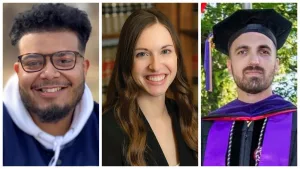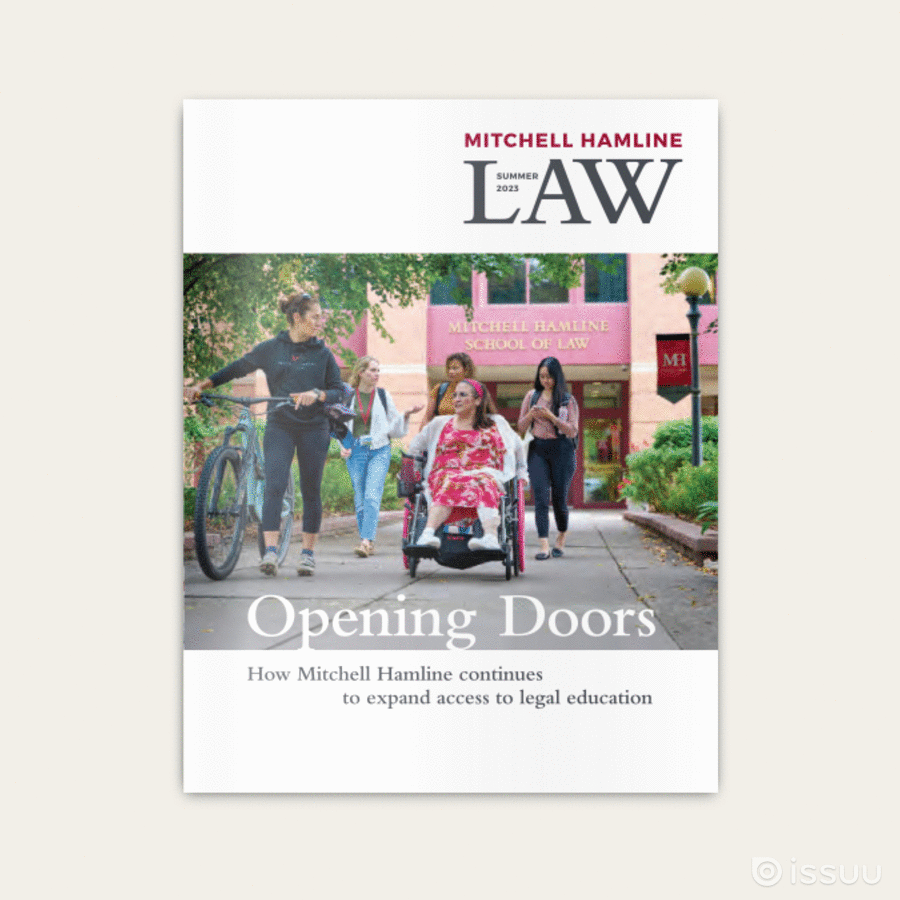Mitchell Hamline continues to innovate in a variety of ways to expand access to law school

“We had different experiences in law school, which is indicative of how Mitchell Hamline can fit a number of different lifestyles and circumstances.”
Michelle and Chris Furrer nearly gave up on law school because the commutes to the nearest law schools would be too long. The married couple lives and works on Chris’ family’s third-generation cattle farm in rural Monroe, Washington, the town where they grew up.
Then they discovered Mitchell Hamline’s blended-learning enrollment option, which lets students attend partially online. Michelle left her teaching job to focus on law school and the farm, while Chris balanced school, the farm, and a remote job.
“It’s been such a gift to attend together,” said Michelle Furrer, who graduated this past spring. “It’s a difficult degree, but we really feel Mitchell Hamline strives to work with second-career students like us.”
For more than a century, Mitchell Hamline and its legacy schools have been rooted in the idea that law school should be available to more people, not fewer. The first law schools in Minnesota to offer night classes and a weekend program are part of that history, which allowed students with jobs to attend part-time. The addition of a day program opened law school to more people, including women. And last decade, the nation’s first partially online enrollment option at an ABA-approved law school expanded legal education across the globe.
“Law school is hard enough to get into without barriers that have nothing to do with your academic ability,” said Anthony Niedwiecki, Mitchell Hamline’s former president and dean. “Where you live, for example, shouldn’t keep someone from applying to law school.
“Our work today is an extension of what we’ve done for more than a century–always being on the lookout for new and innovative ways to introduce more people to the idea of law school that fits their lives.”

L to R: Oliver Nelson, Carrie Backman ’22, Matthew Overcast ’22
The blended-learning option is just one example. Another is the Gateway to Legal Education program, which began in 2019 to expose students from historically underrepresented backgrounds to law school. Students at partner undergraduate institutions earn college credit by taking Mitchell Hamline courses.
Oliver Nelson, a junior at North Hennepin Community College, took a course on psychology, race, and law last fall featuring Mitchell Hamline Professor Rick Petry ’98. Now, Nelson wants to go to law school.
“I’ve made mistakes in my life and all I’ve wanted at those moments was for people to understand my story,” said Nelson. “When I become an attorney, I hope to give that grace to my clients.”
There’s also the North Star Scholarship, which is for blended-learning students who intend to practice in areas underserved by local lawyers.
Carrie Backman ’22 graduated first in her class last year, then returned to western Minnesota, where her husband and she grew up. She joined the firm Fluegel, Anderson, McLaughlin, & Brutlag and has worked on agricultural cases, including Chapter 12 bankruptcies. “My husband works in ag, so relocation was not a viable option for law school,” she said. “If it weren’t for Mitchell Hamline, I would have had to face some tough choices between my personal and professional life.”
Meeting students where they are
At Mitchell Hamline, expanding access doesn’t end with the application process. The school works with students when they arrive to ensure success. A new wellness center opened last year amidst several efforts to remove non-academic barriers from studies.
“Law school has long been thought of as this ‘sink or swim’ place that’s purposefully hard because being an attorney is hard,” said Dean of Students Lynn LeMoine ‘11. “But it’s important to shift that paradigm because we know students and lawyers can thrive with the right systems of support.”
Matthew Overcast ’22 transferred to Mitchell Hamline because of its disability services. Overcast is neurodiverse and had long struggled with things like reading, writing, and auditory processing—but he wasn’t diagnosed until attending a previous law school.
Unfortunately, Overcast said, he struggled to get what he needed. “My experience in higher education has been unnecessarily adversarial when I’ve requested reasonable accommodations,” he said. “But at Mitchell Hamline, everyone treated me with dignity and respect—not like a liability, a lesser person, or a stain on the profession.
“I could focus on learning the law and caring for my family like the rest of my peers, which was a breath of fresh air.”
A focus on wellness doesn’t mean law school will be easier, added LeMoine. “We want to be sure students have the resources to meet the demands of law school and thrive.
“Similarly, offering accommodations is about meeting students where they are and knowing their intellect and potential will shine with reasonable accommodations.”
Back in Washington, the Furrers are also an example of how Mitchell Hamline has continuously expanded clinics and externship opportunities to blended-learning students. Chris worked with the Minnesota Attorney General’s Conviction Review Unit through the Wrongful Convictions Clinic this year. Michelle was a legal resident to Justice Anne McKeig ’92 at the Minnesota Supreme Court. “I knew when we interviewed her that I wanted the chance to work with Michelle,” said McKeig. “And if that meant she would work remotely, so be it. She was an outstanding resident.”
“We went to law school thinking we’d one day open a firm together to serve our community,” said Chris Furrer. “What we’ve learned is there are many ways to serve your community, which is exciting.”

